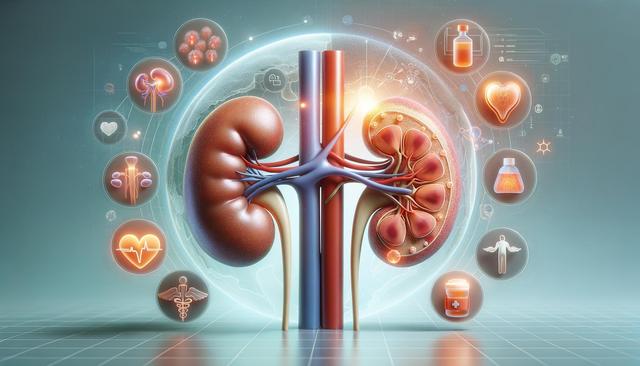Understanding Kidney Disease and Its Impact
Kidney disease is a chronic condition that affects the kidneys’ ability to filter waste and excess fluid from the blood. When these organs are damaged, waste builds up in the body, potentially leading to serious health complications. There are two primary types of kidney disease: acute kidney injury, which occurs suddenly, and chronic kidney disease (CKD), which progresses over time. CKD often develops silently, with few symptoms until later stages. This makes early detection and ongoing monitoring critical for effective management.
Chronic kidney disease can result from a variety of causes, including diabetes, high blood pressure, and genetic disorders. Lifestyle factors, such as poor diet, smoking, and lack of physical activity, also contribute to its progression. Without intervention, CKD may advance to kidney failure, requiring dialysis or a kidney transplant. Understanding the underlying causes and risk factors is the first step in developing a personalized treatment plan.
Medical Therapies and Advances in Treatment
In recent years, the approach to treating kidney disease has evolved significantly. Medical therapies now aim not only to manage symptoms but also to slow disease progression and improve quality of life. One of the key advancements includes the use of medications that target specific pathways involved in kidney damage. These treatments help in reducing proteinuria (excess protein in the urine) and controlling blood pressure, both of which are vital to protecting kidney function.
Common medications used in kidney disease therapy include:
- Angiotensin-converting enzyme (ACE) inhibitors
- Angiotensin II receptor blockers (ARBs)
- Sodium-glucose co-transporter-2 (SGLT2) inhibitors
- Diuretics to manage fluid retention
- Phosphate binders and vitamin D analogs for mineral balance
In addition to pharmaceuticals, emerging therapies such as regenerative medicine and stem cell research are being explored. These innovative methods hold potential for repairing kidney tissue and improving long-term outcomes, although they are still primarily in experimental stages.
The Role of Dialysis in Advanced Kidney Disease
For individuals with end-stage kidney disease (ESKD), dialysis becomes a life-sustaining option. Dialysis performs the essential function of filtering waste and excess fluid when the kidneys can no longer do so. There are two main types of dialysis: hemodialysis and peritoneal dialysis. Hemodialysis typically takes place in a clinic and uses a machine to clean the blood, while peritoneal dialysis can often be done at home using the lining of the abdomen as a natural filter.
Choosing the right dialysis method depends on several factors, including lifestyle, health status, and personal preferences. Some benefits and considerations include:
- Hemodialysis: Structured schedule, professional supervision, but more time-consuming
- Peritoneal dialysis: Greater flexibility, more independence, but requires rigorous hygiene practices
While dialysis is a major adjustment, many people with kidney disease continue to lead fulfilling lives with the support of ongoing care and a well-managed treatment plan.
Diet and Lifestyle Adjustments for Kidney Health
Kidney disease treatment is not limited to medications and procedures—it also involves significant lifestyle changes. A kidney-friendly diet plays a crucial role in managing the condition. Patients are often advised to limit intake of sodium, phosphorus, potassium, and protein, depending on their stage of kidney disease and lab results. Working with a renal dietitian can help tailor a plan that meets nutritional needs while minimizing kidney strain.
Key dietary strategies include:
- Reducing salt to control blood pressure
- Limiting high-phosphorus foods like dairy and processed meats
- Managing potassium intake through selective fruit and vegetable choices
- Controlling protein consumption to reduce waste build-up
Alongside dietary changes, maintaining a healthy weight, engaging in regular physical activity, avoiding tobacco, and managing stress are essential components of care. These lifestyle adjustments support not only kidney health but overall well-being and can help slow disease progression.
Monitoring and Ongoing Care
Ongoing monitoring is a fundamental part of effective kidney disease treatment. Regular check-ups allow healthcare providers to track disease progression, adjust medications, and address complications early. This typically includes blood tests to measure creatinine and estimated glomerular filtration rate (eGFR), urine tests for protein levels, and blood pressure monitoring.
Technology is also improving how patients and providers manage care. Telemedicine, mobile health apps, and remote monitoring devices can enhance communication and ensure timely interventions. Patient education is another key aspect—helping individuals understand their condition empowers them to take an active role in their treatment.
Support systems, including family, peer groups, and counseling services, can also improve outcomes. Emotional well-being is often overlooked, yet it directly affects a patient’s ability to follow treatment plans and maintain a positive outlook. By integrating physical, emotional, and educational support, kidney disease management becomes more holistic and personalized.
Conclusion: A Comprehensive Approach to Caring for Your Kidneys
Managing kidney disease involves more than just treating symptoms—it requires a proactive, comprehensive approach that includes medical treatment, lifestyle changes, emotional support, and continuous monitoring. With advancements in therapies and greater access to information, patients today have more tools than ever to take control of their health. By working closely with healthcare providers and making informed choices, individuals with kidney disease can enhance their quality of life and slow the progression of the condition. Caring for your kidneys is a lifelong commitment, but one that can lead to meaningful, manageable outcomes.




Leave a Reply